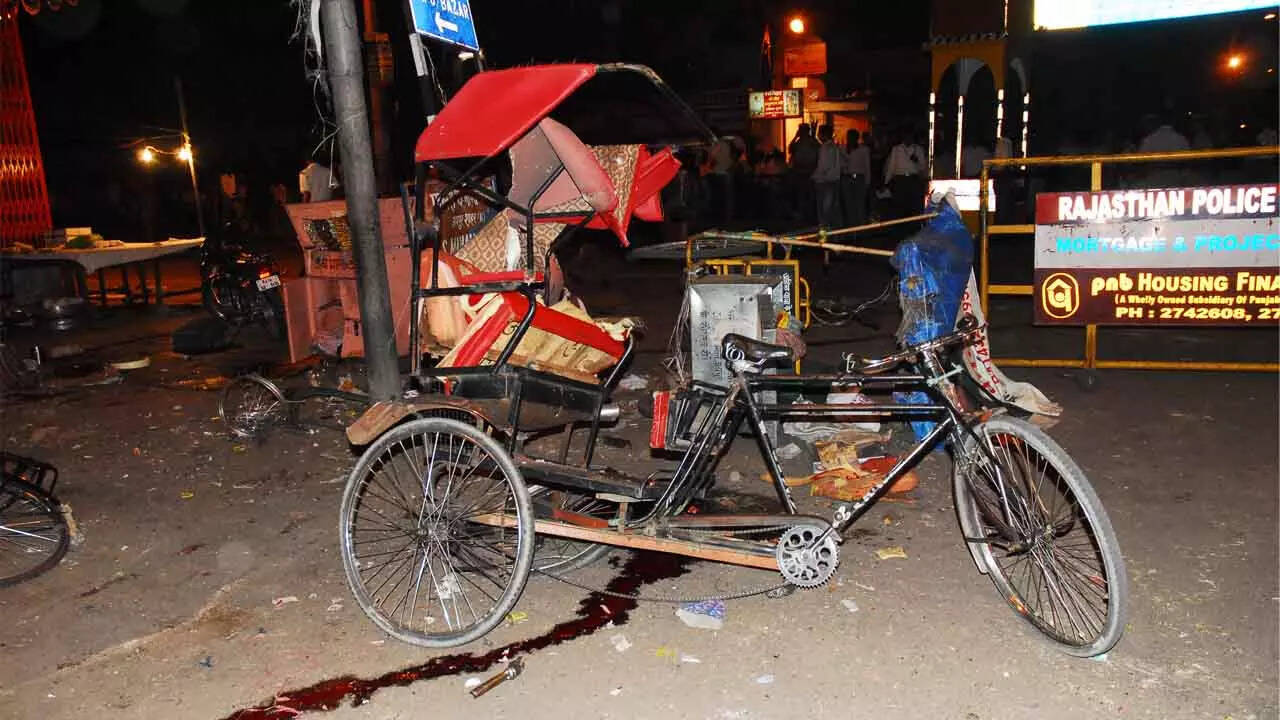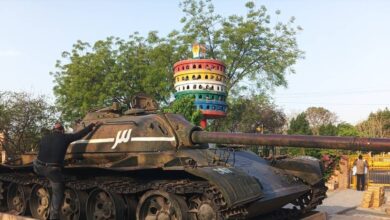Rajasthan
2008 Jaipur serial blasts case: Evidence mismatch, witness plant marred probe | Jaipur News
JAIPUR: Contradictory evidence, fabrications, and a planted witness stood out as salient features in the investigation by Rajasthan Police into the 2008 serial terror strikes in Jaipur, which led to the trial court’s conviction of the accused falling flat in the high court.
The HC, while acquitting the four men sentenced to death for the blasts, pointed out discrepancies galore in the prosecution’s story and also the inept handling of evidence by investigators. The HC pointed at an important prosecution witness who had made the tall claim that he could identify whoever purchased bicycles from his shop in the last ten years. The HC noted that the witness seemed to be a “planted witness” and that his testimony was overreaching.
In another instance, the HC found, after careful examination of a bicycle store’s bill books, that the font size of the numbers differed. The prosecution also failed to provide answers about why in one carbon copy of a bill the date was found to have been changed with ink from May 11, 2008, to May 10, 2008, even as there was a similar contradiction in VAT columns.
“Although we are not required to doubt the investigating agency, the possibility of tampering cannot be ruled out, since specimen writings were neither sealed nor sent in a sealed condition to FSL,” the HC pointed out in its order.
It also appears that investigating officers (IOs) who took up probe files at different junctures continued to make blunders during their investigations, and there was no supervising official to bring the investigation back on track by asking the IOs to submit regular status reports, which is a common practice in the state police.
For instance, one IO delayed sending handwriting samples for forensic examination for over 40 days. When the samples were finally sent, they were not in a sealed condition. “The samples remained with the IO for so many days, and no justification came forth for not sealing the same,” noted the HC.
The HC’s observation raises serious questions about the quality of probe by Rajasthan Police into one of the major blast cases in which 80 people lost their lives.
A major part of this case rested on bicycles which were allegedly used to plant explosives. The investigators produced documents to claim that the four accused, who were eventually convicted, had purchased bicycles from Jaipur to plant explosives. However, the HC, after minutely examining the evidence, found a series of lapses, including a mismatch in the frame numbers of the bicycles, dates of their sale, and the manipulations in the bill books.
The IOs also could not corroborate the travel history of the four men they accused of terror conspiracy. They had claimed the accused had come to Jaipur from New Delhi in a Volvo bus and returned to Delhi by Shatabdi Express on May 13, and that the witness who could have identified the accused as travellers could either be the bus conductor or the travelling ticket examiner (TTE) of the Railways. The HC said that no effort was made to produce these witnesses.
A prosecution witness who was an employee of the Railways admitted that no one could travel on Shatabdi Express without reservation. He also said a reservation slip is to be filled for obtaining a reservation on the train, but the cops made no effort to collect the reservation slips of the travellers.
Anti-Terrorist Squad (ATS) was constituted within Special Operations Group (SOG) of Rajasthan Police following the terror strikes in Jaipur. ATS handled most part of the terror probe.
The HC, while acquitting the four men sentenced to death for the blasts, pointed out discrepancies galore in the prosecution’s story and also the inept handling of evidence by investigators. The HC pointed at an important prosecution witness who had made the tall claim that he could identify whoever purchased bicycles from his shop in the last ten years. The HC noted that the witness seemed to be a “planted witness” and that his testimony was overreaching.
In another instance, the HC found, after careful examination of a bicycle store’s bill books, that the font size of the numbers differed. The prosecution also failed to provide answers about why in one carbon copy of a bill the date was found to have been changed with ink from May 11, 2008, to May 10, 2008, even as there was a similar contradiction in VAT columns.
“Although we are not required to doubt the investigating agency, the possibility of tampering cannot be ruled out, since specimen writings were neither sealed nor sent in a sealed condition to FSL,” the HC pointed out in its order.
It also appears that investigating officers (IOs) who took up probe files at different junctures continued to make blunders during their investigations, and there was no supervising official to bring the investigation back on track by asking the IOs to submit regular status reports, which is a common practice in the state police.
For instance, one IO delayed sending handwriting samples for forensic examination for over 40 days. When the samples were finally sent, they were not in a sealed condition. “The samples remained with the IO for so many days, and no justification came forth for not sealing the same,” noted the HC.
The HC’s observation raises serious questions about the quality of probe by Rajasthan Police into one of the major blast cases in which 80 people lost their lives.
A major part of this case rested on bicycles which were allegedly used to plant explosives. The investigators produced documents to claim that the four accused, who were eventually convicted, had purchased bicycles from Jaipur to plant explosives. However, the HC, after minutely examining the evidence, found a series of lapses, including a mismatch in the frame numbers of the bicycles, dates of their sale, and the manipulations in the bill books.
The IOs also could not corroborate the travel history of the four men they accused of terror conspiracy. They had claimed the accused had come to Jaipur from New Delhi in a Volvo bus and returned to Delhi by Shatabdi Express on May 13, and that the witness who could have identified the accused as travellers could either be the bus conductor or the travelling ticket examiner (TTE) of the Railways. The HC said that no effort was made to produce these witnesses.
A prosecution witness who was an employee of the Railways admitted that no one could travel on Shatabdi Express without reservation. He also said a reservation slip is to be filled for obtaining a reservation on the train, but the cops made no effort to collect the reservation slips of the travellers.
Anti-Terrorist Squad (ATS) was constituted within Special Operations Group (SOG) of Rajasthan Police following the terror strikes in Jaipur. ATS handled most part of the terror probe.





